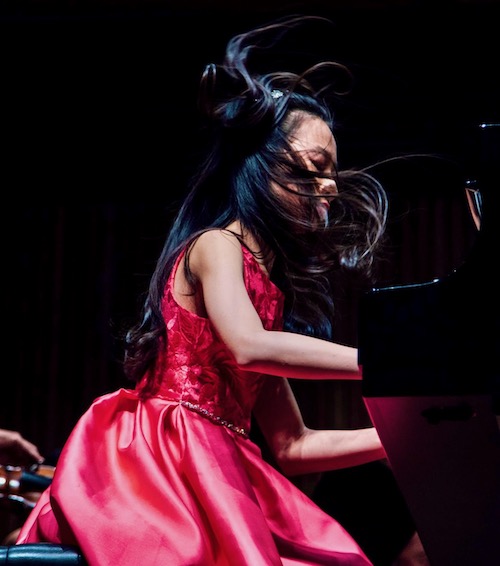Young pianist saves the day for Illinois Philharmonic with thrilling Prokofiev

For the Illinois Philharmonic Orchestra, the third pianist turned out to be the charm.
William Wolfram was originally slated to perform Tchaikovsky’s Piano Concerto No. 3 at the IPO’s season finale Saturday night at Trinity Christian College but bowed out due to a “scheduling conflict.” His replacement was Alexander Toradze, with a change of repertoire to Prokofiev’s Third Piano Concerto. After suffering a heart attack onstage last month, Toradze was hospitalized but cheerfully assured all in an online video from his hospital bed that he was on the road to a quick recovery. Sadly, the 69-year-old pianist died Wednesday, just before he was to come to Illinois to begin rehearsals.
The hectic scramble to salvage this week’s IPO concert brought the third scheduled pianist, Harmony Zhu as an 11th-hour stand-in And the 16-year-old Canadian came, played and conquered in a barn-storming rendition of Prokofiev’s knuckle-busting warhorse.
A child prodigy with an ebullient personality who quickly became an internet favorite, Zhu has been playing and winning music awards since the age of 6. She entered Juilliard at 8, where she became the youngest winner of the concerto competition in the conservatory’s history. Her current teachers are Emanuel Ax and Veda Kaplinsky. In addition to her musical talent, Zhu is a celebrated chess champion, holding the titles of Woman Candidate Master and World Champion of her age group after winning the World Youth Chess Championships.
Astounding prodigy resume apart, Harmony Zhu more than lived up to her billing in Prokofiev’s keyboard showpiece. The teen pianist displayed not only an airtight technique but power and arm strength that belied her slender frame. In the opening movement she showed her chops, blazing through the most clustered thickets of notes and rounding off with a lightning coda that drew extended premature applause from the Palos Heights audience.
This was not a subtle performance but then Prokofiev 3 isn’t exactly a subtle work. At times one wanted a wider expressive and dynamic range in the variations of the central Andantino. But Zhu distilled the more inward sections with a rapt rumination, nicely balancing the showier breakout iterations.
The pianist brought corruscading brilliance to the finale, ratcheting up the spiky bravura with arm sweeps up and down the keyboard and concluding in a pounding, edge-of-the-seat coda with Kirov and the orchestra providing equally fiery support.
The world is full of brilliant child prodigies who fail to pan out. Nearing adulthood, Harmony Zhu clearly has both the stellar technique and musical insight to have a major professional career. Let’s hope she is back with the IPO—or CSO—soon.
Rinsky-Korsakov’s Scheherazade closed the evening. Though not quite the concert-hall mainstay it was decades ago, this kaleidoscopic setting of the 1001 Nights can still provide a superb outing for orchestras with its prominent obbligato violin and numerous opportunities for front-desk players.
That, of course can also be a double-edged Arabian sword when the players are not all on their game. The IPO played well for the most part, albeit with some jarring lapses: early entrances, a muffed trombone passage and a painful cello solo. (Jacob Hanegan the orchestra’s principal cello, who played so well in the Brahms Double Concerto last month, was greatly missed.)
Happily, there were positive contributions as well, most notably principal clarinet Trevor O’Riordan who was excellent throughout, delivering polished, personality-plus solo work.
Portraying the title teller of tales, concertmaster Azusa Tashiro was ideal, bringing pure tone and the requisite sense of otherworldly fantasy to her violin solos. Tashiro was most communicative in the lyric romance of “The Young Prince and the Princess,” rendered with a gentle, coaxing intimacy.
Kirov is in his element with these showpiece Russian works, and such was the case once again. The IPO music director led a surging, rhapsodic performance with sonorous brass, majestic climaxes, ample excitement in the shipwreck and sensitive balancing of the hushed violin-led finale.
The evening began with the belated world premiere of Martha Horst’s Reverberations, which was written for the IPO in 2020 when Horst was composer in residence. The work wears its debts to Sibelius and Debussy rather unapologetically. The sense of an austere landscape’s ebb and flow makes for am attractive if meandering score with the thematic repetitions insufficiently varied for its 12-minute length. Kirov and the IPO musicians provided solid advocacy.
The Illinois Philharmonic Orchestra will open its 2022-23 season October 15 with music of Gershwin and Stephenson. ipomusic.org
Posted in Performances

